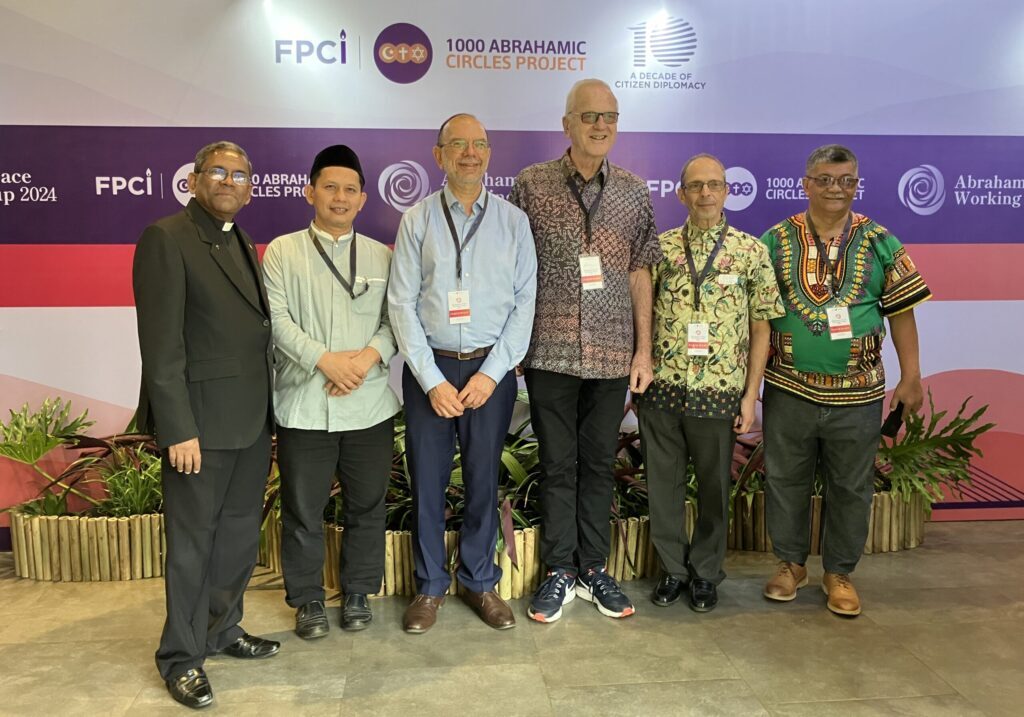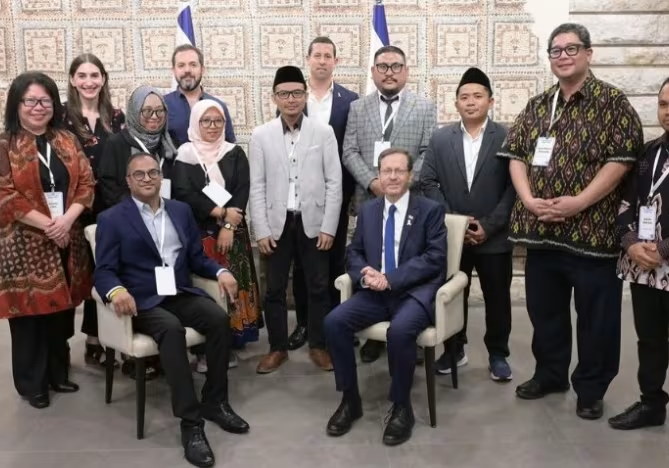Australia/Israel Review
Biblio File: Power and Partnership
Feb 1, 2007 | David Kemp
“The Partnership: The Inside Story of the US-Australian Alliance Under Bush and Howard”
by Greg Sheridan, UNSW Press, 2006, 260 pp. $29.95
By David Kemp
This book should change the terms in which Australia’s alliance with the United States is publicly debated in this country. Its most important claim, from the standpoint of an Australian, is that the US-Australian alliance empowers Australia. The alliance dramatically increments Australia’s capacity not only to ensure its own security, but to achieve its values in the wider world.
If the alliance were ended and the partnership broken, we would not be more independent – we would be a weaker nation and inevitably more dependent, with less influence over our own future and over events beyond our shores. This is the reality about which Greg Sheridan writes so persuasively in this exceedingly readable book.
Sheridan is scathing about the Labor Party’s poverty of strategic thought: “For Labor it is forever 1942”, when Australia was protected by a “moat of blue water” and a brave John Curtin was bringing home the troops in defiance of “treacherous” allies. But the world has moved on. Sheridan has not lost faith in Labor, and notes that, despite Crean and Latham, its leaders such as Beazley and Rudd are strong supporters of the alliance. But Labor has been lazy and populist, and needs some hard thinking (and a willingness to engage the Left internally) to bring its thinking into line with realities.
Sheridan is critical at times of Howard too. He thinks the Australian commitments do not match its rhetoric in the Middle East, and he thinks the government has been “spooked” by China in its handling of the human rights issue. But these failings, in Sheridan’s eyes, have not prevented a significant strengthening of the US-Australia partnership during the Howard years.
Sheridan rejects the view that the alliance means that Australia always has to agree with the United States. He details repeated (unsuccessful) Australian efforts before the Iraq commitment to get “the Americans to focus on post-conflict planning in a more coherent way”. He documents the differing positions of the countries on the handling of China and in the negotiation of the Free Trade Agreement, and how Australia has held firm to its definition of its own interests.
Moreover the disagreements matter more than if there were no alliance. Contrast Australia’s influence with that of New Zealand, which has effectively sidelined itself and diminished its power by leaving the alliance.
Sheridan also makes the important point that it is possible “to independently agree” with the Americans. An example he gives is Australia’s UN vote in 2004 against, first, the referral of Israel’s security barrier in the West Bank to the International Court of Justice; and then, its vote against the resolution that followed the ICJ decision. The US and Australia were on the same side, but Australia could easily have abstained without cost. It was an historic decision based on principle, and not because of the US view, though it did serve to draw Australia and the US closer together.
It is true, and obvious, that the alliance does not come cost free. “Australia will do some things for the sake of the alliance which it wouldn’t otherwise do”, but it is always Australia’s decision what it should do to support the alliance and where its interests lie.
And what are our interests? Whenever it has come to the crunch, Australian governments have recognised that our interests are global. Australia’s security has rested on a global balance for most of its history, first with Britain and then with the United States. Today the threat of terrorism cannot be handled on a regional basis alone. Australian governments, Labor and Coalition, have always recognised that events in the Middle East impinge on Australia’s interests, as do events elsewhere in Asia. The foreign policy and defence challenge for Australian governments is to maximise Australia’s capacity to define and defend those interests.
Sheridan’s argument is that Australia’s global interests are much better protected through the US alliance system than the United Nations. He does not deny the UN has achieved some good things, and that Australia should stick with it for all its failures, but “the real security system in the world is not provided by the UN but by the US alliance system. This is an unpalatable truth to draw attention to as it seems to privilege the US above other nations. But it is true nonetheless. No consequential nation is ever constrained by the UN in a serious matter of national security. Many nations are constrained by the US alliance system”.
For Australia this is a fact of supreme importance, and in many ways a highly positive fact, for in the key global security system, Australia has become an important player.
A compelling example of how the alliance can expand Australia’s power is East Timor. Australia’s successful organisation of the UN mandate for an international force of peacekeepers in East Timor would possibly not have occurred without the US provision of logistics units which Australia did not have to support its deployment, or American operational intelligence support. US diplomatic efforts with Indonesia to support the UN force were probably crucial. “All the region saw that Howard could call the Americans to his side. It was a powerful demonstration of alliance potency”.
Sheridan notes that Richard Armitage, former US Deputy Secretary of State, “rates Australian power higher than most Australians do. He told me in 2003, when he was still in office, that Australia is ‘a global power’ (his words, not mine) and increasingly a ‘critical player on the world stage’.”
How is this possible? Australians do not always see their own country in perspective. Australia is by no means a small nation. Its population is already a third of the UK’s, and growing. Its economy is 13th largest in the world, and – after two decades of economic reform – has expanded in spectacular fashion. Its armed forces are impressive in its region, and, what is important to the Americans, Australia has the capacity to project military power in practice in a way that few other nations do.
But what adds the extra dimension that gives Australia capacity to advance its global interests is its alliance with the United States. Through that alliance it has unsurpassed access to crucial operational intelligence, to state of the art technology, to logistical support of the highest calibre, to unparalleled experience in operations on the ground for its military, and above all access to decision-making at the very highest levels of the most powerful force in world affairs.
Will all this change when Bush and Howard go? Sheridan thinks not, though he concedes future leaders are unlikely to be as close as Bush is to Howard, and that nothing can be taken for granted. “The alliance always needs political nourishment and attention from the highest level”.
In the first place, while the attitudes of leaders can certainly strengthen – or weaken – the relationship, the alliance partnership is based on close mutual interests, common values, and the support of the people. The Australian Strategic Policy Institute in 2005 found that “84 percent of Australians believe the US alliance is important to Australia’s security.” If anything, there is greater public confidence in the relationship than two decades ago.
Secondly, the years ahead are likely to see increasing American strength and influence, not less. While European birth-rates fall, demographics will increase the impact of the United States. Sheridan notes that by 2050, the US will have a population of possibly 500 million – one American for every three Chinese. Our Pacific partner is getting bigger and stronger all the time, and the incentives to make our participation effective strengthen along with it.
Third, the US-Australian alliance is being increasingly institutionalised. The partnership is not static, and in the last decade it has developed and deepened in remarkable ways. Sheridan makes the point that at any one time there are about 350 to 400 Australian defence personnel on assignment in the United States – an indication of the breadth and depth of the military-to-military relationship between the two countries. Some of these are undertaking line jobs in American commands.
Australia has an equity stake in the development of the Joint Strike Fighter. No nation has a closer intelligence relationship with the US than Australia. Indeed, the triangular relationship between the US, UK and Australia is unique. The interoperability of our forces continues to grow. Uniquely, senior Australian officers have commanded major US forces in Iraq and Afghanistan as part of this process.
Sheridan’s book should encourage Australians of all political colours to ask themselves again what their nation is capable of internationally, and to ground this discussion in a realistic understanding of the extraordinary partnership we have developed with the United States, what we bring to that relationship, and how we can through it, significantly increase our capacity to influence the development of a more peaceful world.
![]()
Dr. David Kemp was the Federal Member for Goldstein from 1990-2004, and held various Federal Cabinet portfolios in the Howard government, including Employment, Education and Training, and the Environment. Previously, he was a distinguished Professor of political science at Monash University.
Tags: Australasia, Indonesia






